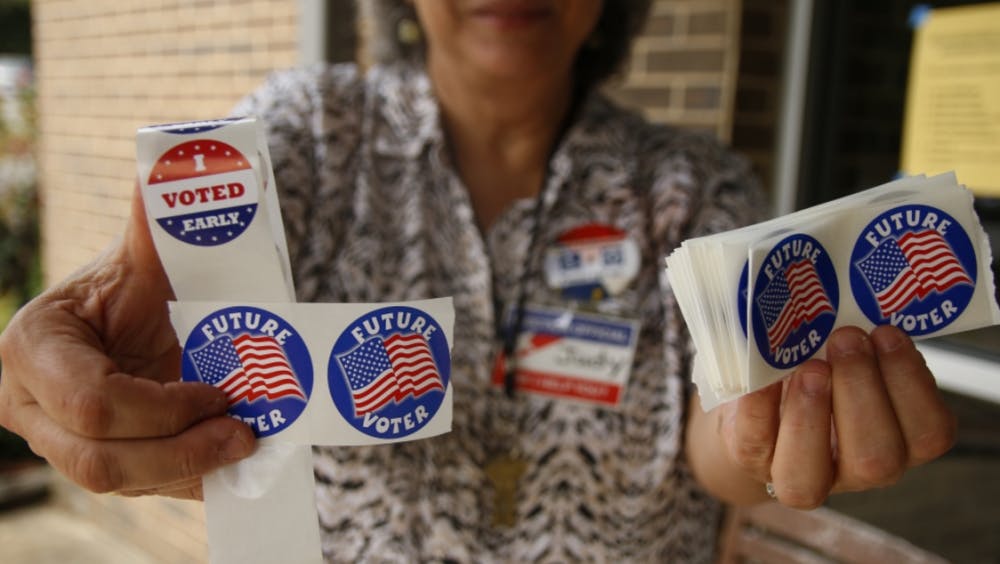Duke did not rank among the top 20 North Carolina colleges for student voter turnout during the 2016 presidential election, according to a recent study.
The University of North Carolina at Chapel Hill and the University of North Carolina at Asheville tied for the highest student voter turnout rate, at 69 percent. Greensboro College’s 66 percent turnout ranked highest among private schools. Duke’s turnout dialed in at just under 50 percent, said Bryan Warner, director of communications for Common Cause North Carolina, a nonprofit focused on encouraging citizen participation in democracy. Each of the colleges listed in the top 20 had turnout rates above 50 percent.
“Duke’s turnout was actually pretty good,” Warner said. “But it was not quite at the threshold required to make our list.”
According to a press release, the study’s authors arrived at their marks by identifying which precincts aligned with each institution’s voters and then calculating the percentage of students voting in those precincts. The release recommended that colleges take certain steps to enable student voting—such as voter registration drives, shuttles to the polls and debate watch parties.
Several campus organizations at Duke did urge students to vote and be engaged. Voter registration drives took place on the Bryan Center Plaza and a bus route was designated to transport students to the early voting site at Devil's Den on Central Campus.
“We had Uber discount codes, free bus rides, student drivers willing to drive you to the polls, some people walked in groups, organizations were giving out food and we even brought celebrities to come and talk about the importance of voting,” wrote senior Amy Wang, vice president of Duke Democrats, in an email.
The Sanford School of Public Policy tried to increase political awareness by sponsoring both a satire festival and a viewing of PBS Frontline’s “The Choice 2016,” said B.J. Rudell, associate director of the Center for Political Leadership, Innovation and Service.
Larry Moneta, vice president for student affairs, teamed up with campus political groups, such as the Public Policy Studies Majors Union, to encourage voting through email blasts sent to the entire student body.
“North Carolina is a crucial swing state, one that has the potential to be decided by the university student demographic, and it is critical that your voice be heard, regardless of who you support,” Moneta wrote in a November email.
Rising sophomore Mitchell Siegel, vice chairman of the Duke College Republicans, wrote in an email that his organization forged a partnership with the Durham County Republican Party to help recruit student voters.
“DCR was very active with recruitment this year and, in my opinion, was very effective,” he wrote.
Wang explained that Duke Democrats worked with local nonprofits and the North Carolina Democratic Party to register almost 1,000 student voters. They made phone calls, tracked polling numbers and used social media to keep students informed.
With so much encouragement in advance of the election, Rudell said he was shocked Duke’s student voter turnout did not crack the top 20.
“I’m surprised honestly that Duke is not up there based on what I’ve seen and heard from students,” he said. “It seems like a very politically active campus.”
But if the low student voter turnout is not the result of poor campus engagement, it is unclear where the blame should fall, Rudell added.
“Different people have different motivations, and so there’s no one-size-fits-all reason why,” he said.
Wang noted that students were likely deterred by the placement of the early voting site on Central Campus, which is a bus ride away for students living on the University's other two campuses.
“I definitely think that the widely inaccessible and relatively unknown location of the Devil’s Den was a major factor,” Wang wrote. “The early voting site move from West Union to the Devil’s Den really hurt us as voters in this election.”
It is also possible that the low turnout numbers are the result of Duke’s diverse student demographics, Siegel and Wang both noted. Public schools generally have more students registered in North Carolina than private institutions like Duke, which have relatively large international and out-of-state populations. In-state students only comprised 12 percent of Duke's rising sophomore class, but at the University of North Carolina of Wilmington, 85 percent of students came from North Carolina.
Siegel and Wang also cited an apparent lack of excitement about either candidate as reason for the University’s low turnout.
“Neither Clinton nor Trump were very favorable on campus,” Siegel wrote. “If a more appealing Democrat than Clinton or even a John Kasich-type Republican runs in the future, I feel that more people will be enthusiastic to vote.”
Wang also noted that this apathy might partially be due to a belief that Clinton would win regardless of Duke’s turnout.
“I feel like a significant portion of the apathy was not so much about the candidates, but about actually getting to the polls with the busy and tight schedules Duke students tend to have,” she wrote. “It would also be fair to say that some students may have felt apathetic about this election. Overwhelmingly people believed that Hillary Clinton would win, and that voting would not make much of a difference.”
Still, Rudell does not anticipate voter turnout being a problem during future election cycles. He said he felt some of the apathy faded after the 2016 election.
“My perspective right now is that in talking with students, there is more awareness on both the right and the left that their votes really count,” he said. “I’ve observed that there is now more of an energy among students about what their role can be in politics.”
Get The Chronicle straight to your inbox
Signup for our weekly newsletter. Cancel at any time.

